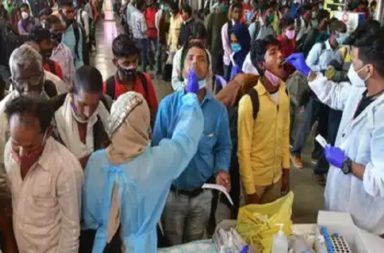The UNICEF and World Health Organization (WHO) called for action to avert measles and polio epidemics as the novel coronavirus disease (COVID-19) continued to disrupt immunisation services across the world. Globally, millions of children are at a heightened risk of polio and measles – dangerous but preventable diseases – amid disruptions to vital immunization programmes due to the pandemic.
The Global Polio Eradication Initiative (GPEI), of which WHO and UNICEF are the implementing agencies, had an estimated budget for outbreak response. However, the current budget and funding could not cover the extraordinary costs caused by the COVID-19 pandemic and the resulting outbreaks of polio and other vaccine-preventable diseases. A total of $655 million ($400 million for polio; $255 million for measles) would be needed to address the immunity gaps in non-Gavi eligible countries and target age groups, the WHO estimates said.
“COVID-19 has had a devastating effect on health services and in particular immunization services, worldwide,” said Tedros Adhanom Ghebreyesus, Director-General of WHO. “But unlike with COVID, we have the tools and knowledge to stop diseases such as polio and measles. What we need are the resources and commitments to put these tools and knowledge into action,” he added. “If we do that, children’s lives will be saved.”
In recent years, there has been a global resurgence of measles with ongoing outbreaks in all parts of the world. Vaccination coverage gaps have been further exacerbated in 2020 by COVID-19. In 2019, measles climbed to the highest number of new infections in more than two decades. Annual measles mortality data for 2019 to be released next week will show the continued negative toll that sustained outbreaks are having in many countries around the world. At the same time, poliovirus transmission is expected to increase in Pakistan and Afghanistan and in many under-immunized areas of Africa. Failure to eradicate polio now would lead to the global resurgence of the disease, resulting in as many as 200,000 new cases annually, within 10 years.
At least 80 million children under the age of one living in lower-income countries were likely at a high risk of contracting diseases such as diphtheria, measles and polio due to lack of immunisation services, according to a WHO report published in May. According to Henrietta Fore, executive director, UNICEF: We cannot allow the fight against one deadly disease to cause us to lose ground in the fight against other diseases. Other deadly diseases also threaten the lives of millions of children in some of the poorest areas of the world. We need additional financial resources to safely resume vaccination campaigns and prioritize immunization systems that are critical to protect children and avert other epidemics besides COVID-19.
WHO and UNICEF also called on countries to respond urgently to emerging disease outbreaks, prioritize immunization in national budgets and strengthen collaboration with partners for increased synergies. They also noted that new tools, including a next-generation novel oral polio vaccine and a forthcoming Measles Outbreak Strategic Response Plan, are expected to be deployed over the coming months to help tackle these growing threats in a more effective and sustainable manner, and ultimately save lives.





